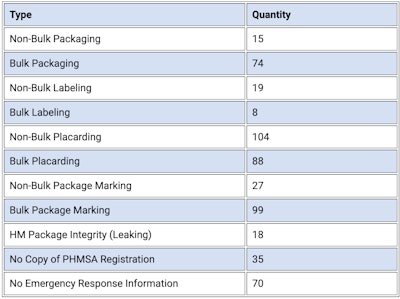Trucking news and briefs for Friday, Aug. 29, 2025:
- See how truckers fared during an unannounced hazmat-focused inspection blitz in June.
- Another holiday weekend, another cargo theft warning. Verisk CargoNet lays out the risks ahead.
- HOS relief for emergency-response truckers in this West Coast state.
Unannounced hazmat blitz put nearly 600 trucks OOS
Over five days this summer, commercial motor vehicle inspectors in Canada and the U.S. conducted 4,629 inspections of commercial motor vehicles transporting hazardous materials/dangerous goods (HM/DG) as part of the Commercial Vehicle Safety Alliance’s (CVSA) unannounced HM/DG inspection and enforcement initiative.
During this year’s HM/DG Road Blitz, which was June 9-13, inspectors affixed 831 CVSA decals to inspected vehicles for having no critical vehicle or specification cargo tank violations on those vehicles.
Conversely, inspectors discovered 1,169 HM/DG violations, of which 598 (51%) were out-of-service violations.
Forty-five jurisdictions participated in this year’s unannounced HM/DG Road Blitz – 10 Canadian provinces and 35 U.S. states. Enforcement personnel inspected 1,469 non-bulk packages/small means of containment, 2,522 bulk cargo tank packages/large means of containment and 447 other bulk packages/other large means of containment.
The following table shows the top violations issued during the blitz in the U.S.:

Between the U.S. and Canada, inspectors identified 20 out-of-service HM/DG package integrity (leaking) violations. Leaking hazardous materials/dangerous goods pose a significant threat to human health and safety, property, and the environment.

Expect cargo theft activity to ratchet up over Labor Day weekend
 Verisk CargoNet has recorded more than $10.5 million in cargo theft losses during the Labor Day holiday period over the last five years.Verisk CargoNet
Verisk CargoNet has recorded more than $10.5 million in cargo theft losses during the Labor Day holiday period over the last five years.Verisk CargoNet
As the Labor Day weekend arrives, cargo theft activity is poised to reach dangerous new levels across the United States, according to cargo theft recording firm Verisk CargoNet.
An analysis by the firm of reported Labor Day thefts over the past five years reveals an escalation in theft that suggests unprecedented risk during the upcoming long weekend.
“Labor Day weekend has become a prime hunting ground for cargo thieves, with criminal activity more than doubling since 2020,” said Keith Lewis, vice president of operations at Verisk CargoNet.
Lewis said that in an analysis of 214 theft events between the Thursday before and the Wednesday after Labor Day over the last five years “shows a clear pattern of escalating criminal behavior. Friday has emerged as the most dangerous day of the Labor Day period, accounting for 45 thefts over five years, with 2024’s Friday before Labor Day recording a record-high of 16 incidents in a single day.”
California and Texas remain the epicenters of Labor Day cargo theft activity, accounting for 85 of the 214 incidents analyzed, with crime highest in San Bernardino County, California, and Dallas County, Texas.
Criminal organizations have demonstrated preferences for specific freight categories during holiday periods. Food and beverage shipments -- particularly shellfish and pork -- top the target list with 36 incidents, followed by electronics such as televisions (23 incidents), and household goods like appliances and furniture (23 incidents). Vehicle accessories, including tires and automotive parts, account for 18 incidents.
The surge in criminal activity has been particularly worrisome in 2025. Verisk CargoNet identified notable increases in reported cargo theft activity in the Northeast between June and August, particularly in New Jersey, where incidents have risen from 14 in 2023 to 36 in 2025.
“What makes this Labor Day weekend particularly concerning is the rise of sophisticated fraud schemes,” Lewis added. “Organized criminal groups are purchasing established motor carriers with legitimate operating authority and strong reputations and using them as a front to book multiple high-value shipments. Once they’ve secured the freight, they disappear with the goods, often stealing several truckloads in a single day before the industry can react.”
These schemes are often highly coordinated, the firm noted. After acquiring a carrier, criminals rapidly schedule as many pickups as possible within a short time frame, often on the same day, to maximize their haul before shippers and brokers detect the fraud and cancel appointments.
The combination of extended holiday closures and reduced staffing levels around the long weekend creates an ideal environment for these tactics to succeed.
Verisk CargoNet warns that the days immediately preceding and following Labor Day weekend represent one of the highest-risk periods for cargo theft activity. Historical data shows the Friday before Labor Day poses the greatest single-day threat, with criminal activity particularly intense as many businesses close early and security measures are relaxed.
Wildfire HOS relief extended for Oregon
The Federal Motor Carrier Safety Administration has once again extended an hours-of-service waiver for truck drivers providing direct assistance to wildfires in Oregon.
FMCSA previously extended a declaration issued by Oregon Gov. Tina Kotek in response to the wildfires. That waiver was set to expire on Aug. 30.
On Aug. 24, the state of Oregon requested FMCSA again extend the emergency relief from 49 CFR 395.3 and 395.5 for commercial motor vehicle drivers providing direct assistance to the emergency. Because emergency conditions have not abated, the agency said, FMCSA is extending the relief for another month, through Sept. 30.
The regulatory relief under the extension of the declaration applies regardless of the origin of the trip, so long as the carrier or driver is providing direct assistance to the state of Oregon. Direct assistance does not include transportation related to long-term rehabilitation of damaged physical infrastructure after the initial threat to life and property has passed, FMCSA said. Nor does it include routine commercial deliveries, including mixed loads with a nominal quantity of qualifying emergency relief added to obtain the benefits of the declaration.









